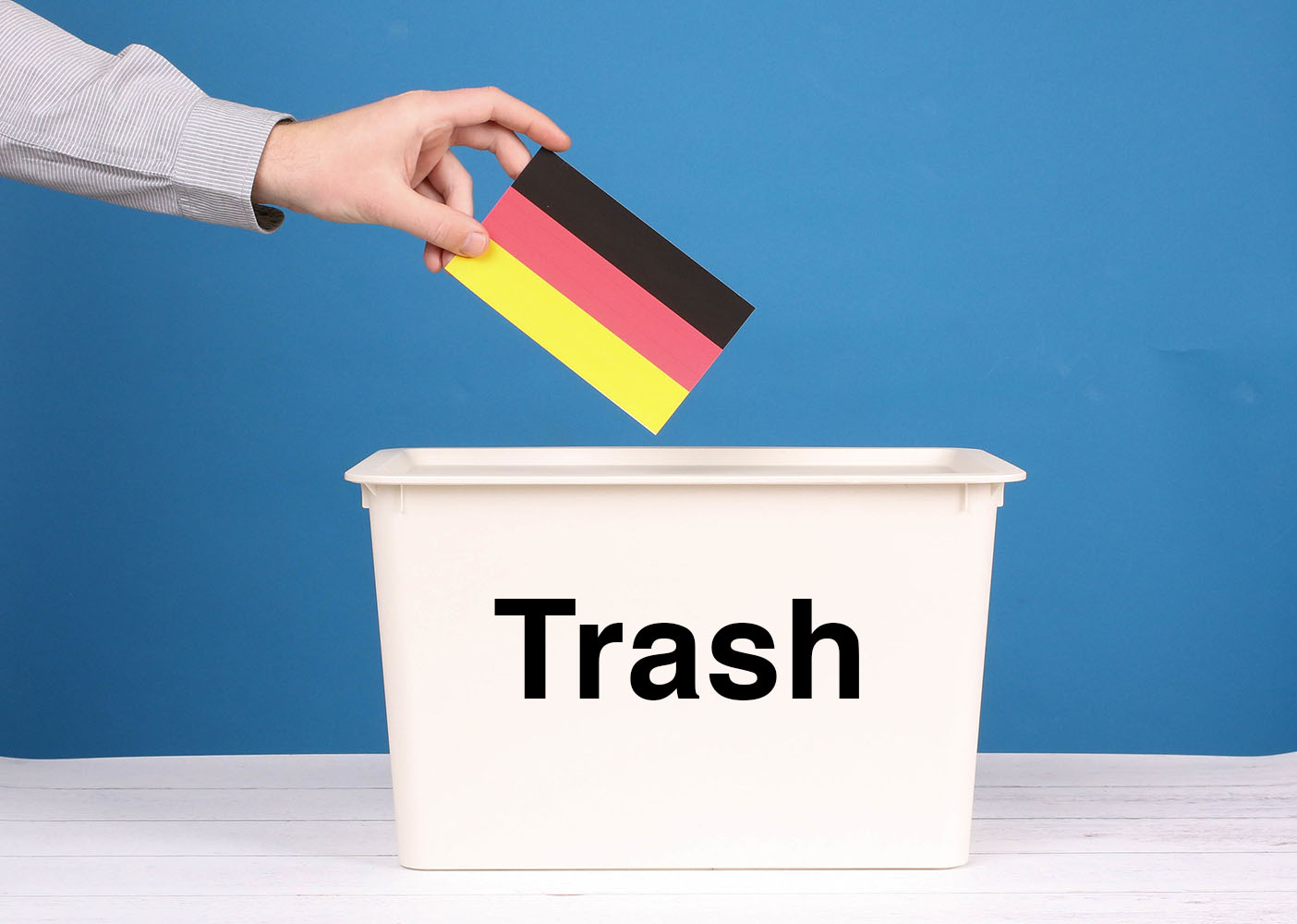After the results of the federal election were announced, the German Social Democrats’ candidate for chancellor appeared defiant. Under no circumstances would he lead his party into another “grand coalition” with the Christian Democrats. Big words for someone who had just earned his party the worst election result of the postwar era.
The candidate was Martin Schulz, the year 2017, and his words were a legendary exercise in hollow grandstanding. The liberal Free Democratic Party soon announced, however, that it would not form a coalition with Angela Merkel’s CDU/CSU (Christian Democratic Union/Christian Social Union parties) and the Green Party. As a consequence, German president Frank-Walter Steinmeier successfully pleaded with Schulz to lead the Social Democratic Party of Germany—the SPD—back into a joint government under the leadership of Merkel. Germans value stability and predictability above all; in the postwar period, there has never once been a government that didn’t hold an absolute majority in parliament. So Schulz cracked.
After Schulz came Scholz. Olaf Scholz had twice been a cabinet minister during Angela Merkel’s long reign. Before that he had served as the mayor of Hamburg, and long before that, he was a protégé of the SPD’s last chancellor, the neoliberal “New Labour”-style Gerhard Schröder. This year the SPD settled on Scholz as their candidate for chief executive. This at first appeared like a thankless assignment—in the early summer months, the party remained below 20 percent in national polls. Even the Green Party, their “junior” coalition partner during the Schröder years, was threatening to outperform them. But in the end the election campaign turned into a popularity contest between the CDU, SPD, and Green’s leading candidates. As many people joked, the CDU candidate Armin Laschet literally had the word “flaccid” (lasch) in his name—a fairly accurate description of his awkward personality. Scholz, by contrast, had enough of an aura of statesmanship that he eventually carried the day.
In last Sunday’s federal elections, the SPD came out on top and Scholz may very well be Merkel’s successor. The party reached 25.7 percent, almost two more than the Christian Democrats who just registered their worst result ever. In 2013, the SPD received a similar result, which was the party’s third-worst outcome since World War II and was regarded then as a disappointment. That this year’s results are being celebrated as a great turnaround shouldn’t distract from the fact that the SPD and CDU/CSU, the two major parties which once held a combined 90 percent in parliament, have steadily lost in significance.
Too recent in memory is the SPD-Green government, which under Schröder slashed welfare spending via the so-called “Hartz” reforms and led Germany into its first active war engagement since 1945 with the NATO assault on Yugoslavia. The SPD’s disastrous results were a clear consequence of Schröder’s iron-fisted austerity, which the young Scholz persistently supported.
The Social Democrats frequently defend their austerity policies as having been necessary to preserve Germany’s international competitiveness. Throughout the 1990s and into the early 2000s, the country was seen as the “sick man of Europe” thanks to its persistently high unemployment rates. But since the mid-2000s, unemployment has dropped, and the nation comfortably weathered such economic crises as the Great Recession.
The SPD likes to take credit for this success, but as a team of economists convincingly argued in 2014, the modern “jobs miracle” had little to do with Schröder’s reforms. Instead, Germany’s unique model of industrial governance deserves the praise. As they put it, “the German system of industrial relations is not rooted in legislation and is not governed by the political process, but instead is laid out in contracts and mutual agreements between the three main labor market parties: trade unions, employer associations, and works councils.” This model of so-called “Tarifautonomie” (wage autonomy)—guaranteed in article 9 of the German constitution—has allowed for a decentralized setting of wages, which offers businesses the ability, even on the level of the individual firm, to respond to economic pressures by suppressing wages. This, in turn, is often rubber stamped by the unions who worry about the further offshoring of production in the export-centric manufacturing sectors that make Germany the economic powerhouse of Europe that it is.
The “jobs miracle,” in other words, came at the expense of wage growth, especially among low-income earners who have seen their real wages decline over the past twenty years. As a result, income inequality has been steadily on the rise. According to economic commentator Alexander Horn, Germany’s comparatively cheap labor costs make it “more attractive for companies to employ additional workers rather than investing in full or even partial automation. Hence, the current employment boom is a consequence of an economy driven not by innovation and productivity, but by economic stagnation.” The official unemployment numbers may be low, but job creation is driven by the low-wage service sector, and not the high value-added industries. This imbalance is mirrored in German economic growth rates, which have been hovering frequently below two percent in recent years. A record number of Germans now face old-age poverty, as the opposition party Die Linke (The Left) reminds.
So, naturally Die Linke should have stood to benefit from these dire conditions. Instead, its support collapsed by almost half in this year’s elections. At the time of this writing, the party might not even crack the five percent threshold needed to win faction status in the Bundestag. (It might only circumvent the problem by winning enough direct mandates in individual districts—in Germany, you have two votes: one to elect your direct representative, the other to vote for a party list. Die Linke fared extremely badly in the second vote, though it remains competitive in some urban districts in the former East German states.)
As the prominent Die Linke politician Sahra Wagenknecht has complained, the party failed to position itself as the new workers’ party after the SPD’s right-turn, opting instead to stress the concerns of urban “lifestyle” liberals who are more concerned with gender pronouns than bread-and-butter economic issues. Other party leaders reacted to Wagenknecht’s criticisms by trying to kick her off the ballot. The intra-party fight made Die Linke particularly unattractive to voters who, like their nation’s political leaders, prefer stability at the top.
Meanwhile the other “protest party”—the right-wing Alternative für Deutschland (Alternative for Germany)—failed to make inroads. AfD lost roughly two points since the last election in 2017, when it first entered parliament with an impressive 12.6 percent. The party had initially scraped off support from the Christian Democrats’ right wing, but has since failed to build a broader base, likely due to its overtures to the far-right, which tends to scare off other disenchanted voters with more moderate social views.
So how might the SPD govern, presuming Scholz will be able to form a new coalition (if his preferred partners, the Greens and the FDP accede)? A clue might be found in one of its major platform promises—the introduction of a so-called “citizen money.” Described as a new form of guaranteed minimum cash payment for the unemployed, it is supposed to replace the comparatively meager unemployment payouts (commonly referred to as “Hartz IV”) that the SPD and Greens introduced the last time they were in power. But the cash payment was means tested and created a highly intrusive bureaucracy that was given the power to surveil the recipients’ personal lives in order to see whether they made any sort of money on the side. That’s why Hartz IV has always been considered demeaning. But the so-called “citizen money” may just be a case of “semantic rebranding,” as the social scientist Stefan Sell put it. While it may extend the time window before the newly unemployed get subjected to the state’s oversight, Sell complains, the citizen money doesn’t fundamentally transform the nature of the presently existing welfare regime. Instead, the system would merely be repaired around the edges, without a greater push to reduce overall poverty.
If the Greens enter the coalition, they will want to prioritize responses to the “climate crisis.” But this would merely mean investing more into alternative energy sources like wind and solar, at the expense of much more reliable technology such as nuclear, which the Greens pushed to phase out during the Schröder years. Given the country’s dependence on the famously unreliable wind and solar, it is no wonder that German consumers pay the highest electricity bills in the EU which, in turn, has contributed to the highest reported inflation rates in thirteen years.
Guaranteed cash for the poor, combined with a regressive energy policy—it’s a familiar formula that makes up the central plank of nearly every center-left party in the Western world. But given that the populist sentiments of recent years have faded, the tried-and-true formula was enough to sweep the German Social Democrats and Greens back into power this time around—with generous help from a flaccid opponent.
So, once more, “order” prevails in Berlin. But given the uncertain futures faced by German voters, how long will it last?









